Affordable Plumbing Engineers for Water Heaters
Seattle Water Heaters
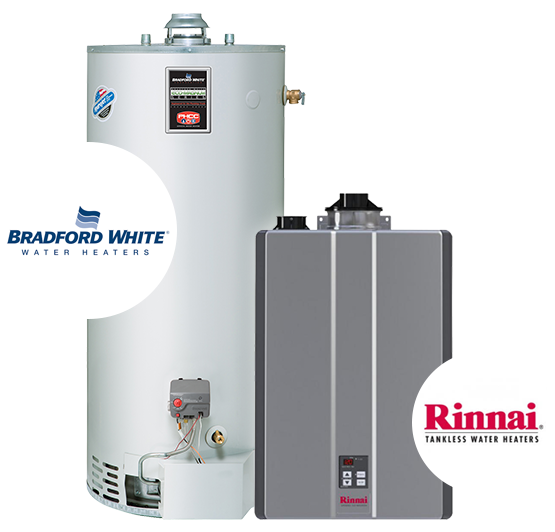
Water Heater Replacement Cost
The installation of a water heater is one of the most common (and crucial!) home modifications. The cost of replacing a hot water heater can range from $500 to $2,500 (or even more) depending on whether you need a straightforward one-for-one exchange or a complex tankless system update. Here is a detailed look at prospective costs for water heater replacements to help you in making your budget.
Replacement Cost by Type of Water Heater
The cost of replacing a water heater varies based on the type of heater. A variety of heaters, including electric-powered and gas-powered heaters, can be installed. Before choosing the kind of water heater to buy, homeowners should carefully weigh all of their options.
-
Electric water heaters
Electric water heaters are less expensive to install but more expensive to operate, depending on your local electricity prices. In general, an electric water heater takes longer to heat water than a gas-powered one and will not function during a power outage. These water heaters do require less upkeep and pose fewer safety risks.
Installing an electric water heater normally costs between $600 and $3,500 (including cost of labor). The initial cost of the units is significantly lower; you can spend as little as $200 on a modest electric water heater for a single appliance. Although these units are approximately 95% energy efficient, overall costs of operation depend on the price of electricity at the time.
Electric water heaters (either tank or tankless) work best if you live in an apartment or a smaller space because they don’t require different types of venting.
-
Gas water heaters
Despite the greater initial cost of a gas water heater, homeowners will ultimately save money because electricity is often a more expensive energy source. Gas water heaters often heat water quickly, and energy-efficient variants are available. When the electricity goes out, gas water heaters still function, but there are always safety concerns with a gas-powered heater.
The typical cost to replace a gas water heater ranges from $700 to $2,700. One of the most popular varieties, gas-powered water heaters typically heat water more quickly than electric heaters.
Though they are less energy efficient and cost $100 to $200 more than electric units. As gas prices rise, you may find yourself with significant operating costs. However, the long-term cost of the gas option is less expensive if your area has high electric bills.
-
Propane
The typical cost to replace a propane water heater ranges from $700 to $2,500. Natural gas can be substituted with this kind of appliance. They are frequently found in remote places without natural gas lines or in houses that are off the grid, like a mountain cabin or island property.
-
High-efficiency
Installing a high-efficiency water heater typically costs between $1,500 and $3,000, though prices can vary based on the model. These appliances offer upgrades like high-quality insulation, plastic tanks, and sophisticated controls that can detect leaks. They are 100% to 300% more efficient than a conventional tank water heater. In other words, they cost more up front, but you end up saving money on utilities.
Even though you use the water heater every day, you probably are unaware that it is your home’s second-largest energy consumer. Investing in a high-efficiency water heater is a cost-effective and sustainable move.
-
Indirect water heaters
Indirect water heaters are not new; in fact, they have been around for quite a while. But as environmental awareness and energy prices rise, indirect units are once again becoming popular. Indirect water heating can save money and reduce their energy use simultaneously.
These appliances have the most reasonable operating costs while having an average installation cost of $1,200 to $3,500. The most popular feature is the adaptability to use various energy sources from a local source, including gas, oil, propane, electric, solar, or any combination of these.
Indirect-fired heaters use a coil inside the tank that, like a heating zone, is connected by piping to a boiler. The coil’s heat radiates, warming the water in the tank. Compared to conventional gas or electric tanks, these tanks cost more and take four to eight hours to build.
-
Solar water heaters
A solar water heater uses the sun’s energy to warm the water. The most expensive water heaters on the market, solar water heaters come in a variety of shapes and sizes. A solar water heater typically costs between $1,700 and $5,500, labor included. Depending on the type, installation fees, ongoing maintenance, and the accessibility of a qualified contractor, prices might even reach $13,000. Although these units are more expensive up front, they don’t truly cost anything to operate once routine maintenance is needed —as long as the sun is shining.
Factors Affecting Water Heater Replacement Cost
Hot water heater prices might vary greatly when it comes to replacement. Not all installations are simple, and you’ll also be paying for materials and labor. Here are a few factors that affect the job’s overall cost.
Tank vs. tankless
Storage tank and tankless water heaters are the two primary types of water heaters. A huge tank that normally has a capacity of 30 to 80 gallons is used as a hot water storage unit by tank water heaters. In the United States, tank-style heaters account for more than 90% of all installed water heaters. Two to three times as much money is spent on a tankless water heater as opposed to a tank water heater. Because it requires more work to install, the labor expenses will also be greater. Tankless water heaters heat the water as it enters the unit to provide hot water on demand.
The average cost for tank-style water heaters ranges from $700 to $2,500, including labor and supplies. They can be powered by gas, propane, electricity or solar energy, and typically last about 8 and 12 years. They are comparatively simple to install, but they consume a lot of space and energy because they are constantly on. A tankless water heater can cost between $1,200 and $3,500, and it can endure for more than 20 years. These water heaters require more time to install—usually 2 to 3 hours on average—and can be powered by gas or electricity. Tankless heaters are more expensive to install but they are smaller and use less space. They are not the best option for households in colder climates, and larger homes could require multiple units to supply enough hot water.
Tank size or tankless water heating capacity
For tank-style systems, hot water heater sizes are measured in gallons or gallons per minute (for tankless systems). Tank-style heaters typically have a capacity of 20 to 100 gallons. The price will increase as the tank size increases. Here are some typical costs broken down by size (including labor).
- 80-gallon tank: $1,350 to $3,500
- 75-gallon tank: $1,250 to $3,500
- 50-gallon tank: $650 to $2,400
- 40-gallon tank: $550 to $2,350
- 30-gallon tank: $550 to $2,100
For tankless water heaters their capacity is measured in Gallons Per Minute (GPM);
- 1–2 GPM $150–$250
- 2–3 GPM $200–$600
- 3–4 GPM $300–$700
- 5–6 GPM $400–$1,200
- 7–8 GPM $500–$1,500
- 8+ GPM $600–$2,000
- Point-of-use $150–$500
- Whole-home $500–$2,000
A water heater that holds 40 to 50 gallons—or heats 3 to 5 gallons per minute—is typically sufficient for a household of two or three people. Larger families will require a larger tank, but if your family expands, you may only need an expansion tank rather than a replacement. An expansion tank typically costs $40 to $400 plus labor.
Water heater type
The majority of water heaters are powered either by natural gas or electricity. A gas pilot light or an electric coil provides the heating. Replacement costs for electric water heaters compared to gas water heaters, are $100 to $200 less. Even though natural gas water heaters are more expensive and less energy efficient than their electric cousins, due to the high cost of electricity, natural gas is frequently the most economical choice over the long term. Since they don’t require venting, electric water heaters might be the ideal option for tiny flats or extremely small spaces. Homeowners can estimate their replacement water heater’s cost by deciding between gas and electric water heaters.
Additionally, homeowners have other options like solar, indirect, propane and high-efficiency. With solar water heaters costing the most, followed by the high-efficiency water heaters then the indirect water heaters.
Direct vent vs power vent
Exhaust from gas water heaters needs to be vented either directly overhead through a vent flue or through a power vent fan. Direct vent water heaters emit their exhaust up through a flue pipe. To install the vent pipe when switching from an electric water heater to a direct vent gas one, budget an extra $500 to $1,000.
Water heaters with power vents employ a fan to push exhaust out of vent pipes. They can use inexpensive PVC pipe in place of more expensive metal flue pipe to discharge exhaust horizontally or vertically. Compared to a direct vent model, this system gives greater flexibility in locating the unit and is more energy-efficient. Compared to direct vent units, power venting units cost $300 to $600 more, and cabling and electrical work increase the installation cost by another $300 to $500.
Non-condensing vs. condensing
Non-condensing and condensing tankless water heaters are the two varieties available today. Condensing water heaters have efficiency ratings that reach as high as 98%, making them more effective than their non-condensing counterparts. Utilizing “waste heat” from the flue gases, these appliances heat water. As a result, they are generally more efficient since they are able to recover part of the heat that would be lost in a non-condensing unit.
Although not as efficient as condensing units, non-condensing tankless water heaters are still nonetheless extremely effective. Similar to how a conventional water heater operates, these units heat water using a burner. A condensing tankless water heater will cost more than a non-condensing one, but the longer it lasts, the more money it will likely save you.
Geographical location
The cost of replacing the water heater and the overall cost of fuel prices is influenced by the home’s location. The climate can affect energy usage and the temperature of the water entering the heater depending on where the water heater is positioned in the residence. More energy is required to heat water to the specified temperature the colder it is when it first enters the heater.
Water heater location
The cost to replace a hot water heater can also depend on where it is located in the house. The cost of installation may increase if the water heater is to be installed in an awkward location, such as an attic or basement, or if the installers must carry the water heater up or down numerous flights of stairs. The location of the water heater is crucial since there is always a chance that it could spring a leak, which could result in serious damage to the house.
Labor costs
The labor cost makes up a sizable amount of the installation cost in addition to the unit’s cost. The price of labor could range from $150 to $1,000 or more. They differ depending on the size, kind, and location of the water heater, as well as the hourly fee of the installer.
-
Cost per hour
The majority of the work required to install a gas or electric water heater can be done by a plumber. Their hourly labor costs range from $45 to $150. You’ll also need to employ an electrician at a rate of $50 to $100 per hour if the project involves significant electrical work, such as building a new circuit or switching from gas to electricity.
-
Average hours per water heater type
Electric and gas tank-style water heaters typically require three hours to replace. A tankless water heater installation takes eight to ten hours. Moving the water heater to a different place within the house, switching from gas to electric, (or vice versa) can all greatly lengthen the project and potentially necessitate the hiring of additional workers like carpenters or drywall installers.
Additional Costs and Considerations
-
Permits
Depending on the type of water heater being installed and the amount of work required for the installation, permits for water heater replacement can cost anywhere from $100 and $1,500. Homeowners have the option of obtaining the permit themselves or paying the contractor directly to handle it, and have the cost added to the final bill.
-
Warranties
A warranty that typically lasts between 8 and 12 years is provided with both tank-style and tankless water heater appliances. If homeowners decide to prolong the coverage period, the warranty may be more expensive. If the old unit cannot be fixed and is still covered by warranty, its replacement may be covered.
Many house warranties also cover the maintenance or replacement of water heaters. Remember that if the appliance has not received routine maintenance, warranties may be void. Some plumbers will also provide a warranty for their services, which can include fixes that are not covered by the product’s manufacturer warranty.
-
Water heater removal
Depending on the contractor’s hourly rate, the size and the location of the old water heater, the price to remove it might range from $100 to $500. Homeowners could have to pay more for the removal of the old water heater if it is difficult to get to.
The removal and disposal of your old water heater will also cost money. You may have to arrange for junk pickup to have it taken away.
-
Expansion tank
In the case that the water heater’s tank breaks, an expansion tank is a safety device that prevents pipes from bursting. Although many cities have building rules that mandate they be added when water heaters are updated, many older homes do not have them. The price range for installing a new expansion tank is $40 to $400.
-
Unit relocation or fuel conversion
The price of installation may increase dramatically if a water heater is relocated inside the home, switches fuel sources, or even gets a bigger tank. Rerouting a water line costs between $350 and $1,700; framing a wall costs between $200 and $400; installing drywall costs between $800 and $2,500; adding a gas line costs between $250 and $800; and extending electrical wiring costs between $500 and $1,500. If you are considering anything other than an exact replacement, speak with your installer to get the details of all the extra costs.
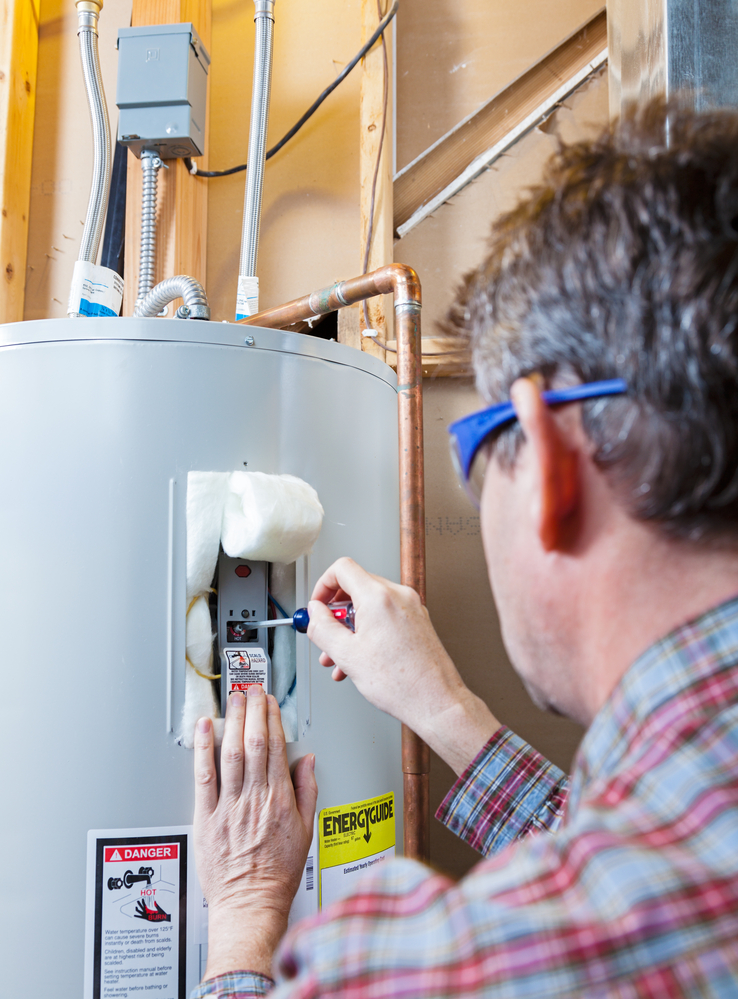
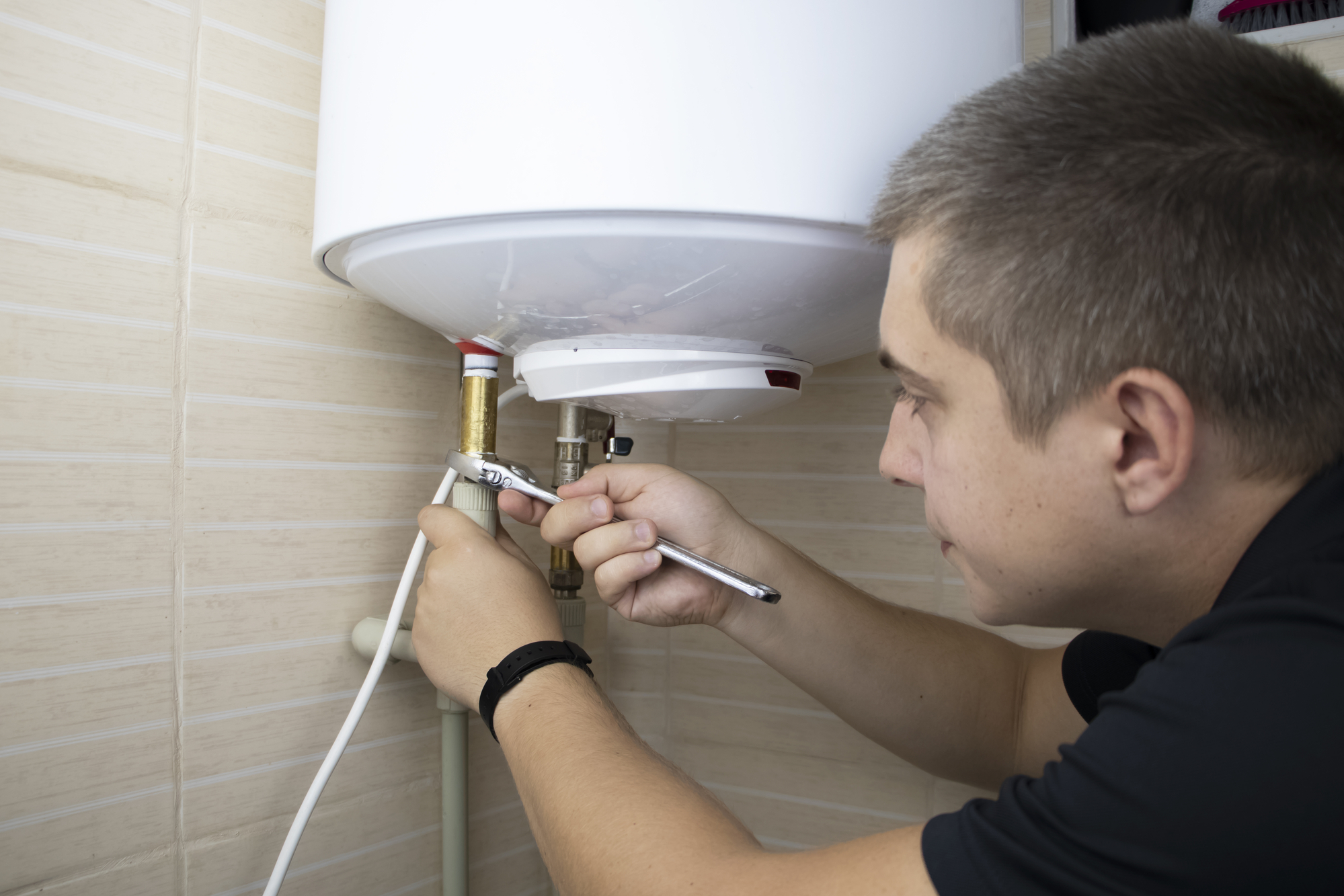

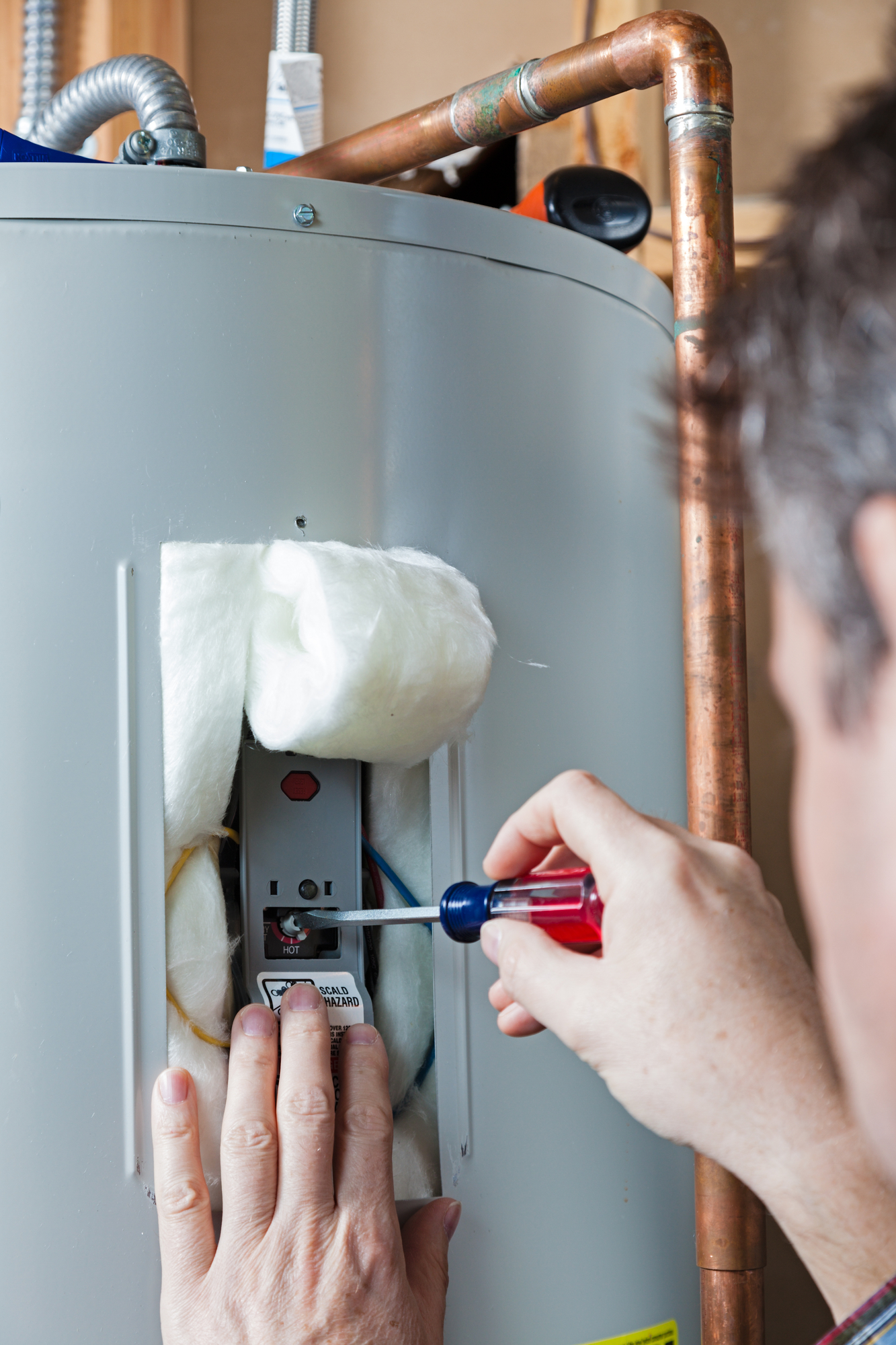
DIY Cost of Water Heater Installation or Replacement
Simply put, installing a water heater on your own is not a good idea and is frequently even illegal. You will require a permission to carry out any work because it involves water pipes, gas lines, or electricity lines. Only a licensed contractor will normally be given authorization by your city, state, or homeowners association.
Even insurance requirements could apply. Regardless of the laws, there is a long list of things that could go wrong. A gas leak that results from anything as simple as over-tightening a gas control valve could start a fire or poison someone with carbon monoxide. Avoid the potential risk by using a local water heater installer instead.
But if you decide to handle the water heater installation by yourself, you would not have to pay for labor. Labor charges for installing a standard replacement water heater unit typically range from $150 to $450, but this cost can jump to $2,500 when converting from a tank to a tankless model. The majority of plumbers will offer a flat rate that covers both labor and materials, but some may bill by the hour.
How to Save Costs When Replacing Your Water Heater
Being an emergency investment, replacing a water heater is not exactly a budget-friendly project. Fortunately, there are a few ways to save money.
-
Consider the size
The cost of a water heater can be significantly reduced by selecting the proper size. Think about how many gallons the heater can produce every hour in addition to how many gallons the tank can contain. The tank sizes for conventional tank-style water heaters range from 20 to 100 gallons. A 40-to-80-gallon tank is the most popular size. It is advised that homeowners get a water heater that is appropriate for their household’s requirements rather than one that is excessively large. The homeowner will spend more for a larger heater and for the energy over the course of the appliance’s life if they purchase a unit that is too large.
-
Fix instead of replacing
In general, the lifespan of a water heater ranges from six to fifteen years on average, depending on the model and level of maintenance. You may want to consider having your water heater repaired rather than replaced if it is still within the range of its typical lifespan. The price of a water heater repair can range from $100 to $1,300 (including labor of course). If you only require a minor repair, such as a valve replacement, it can be pretty straightforward too.
-
Tax credits, discounts, and rebates
For the replacement of water heaters and major appliances, utility companies provide rebates and special offers. The Energy Star Most Efficient gas water heater if used by homeowners qualifies them for a $150 tax credit. Energy Star offers a comprehensive rebate finder list of additional money-saving incentives that is searchable by ZIP code.
-
Maintain the same kind of water heater
If you need to replace your water heater, consider switching to a similar model to save on installation fees. As long as your installations are in excellent shape, this largely avoids the costs associated with building new electrical wiring, gas lines, water lines, and plumbing.

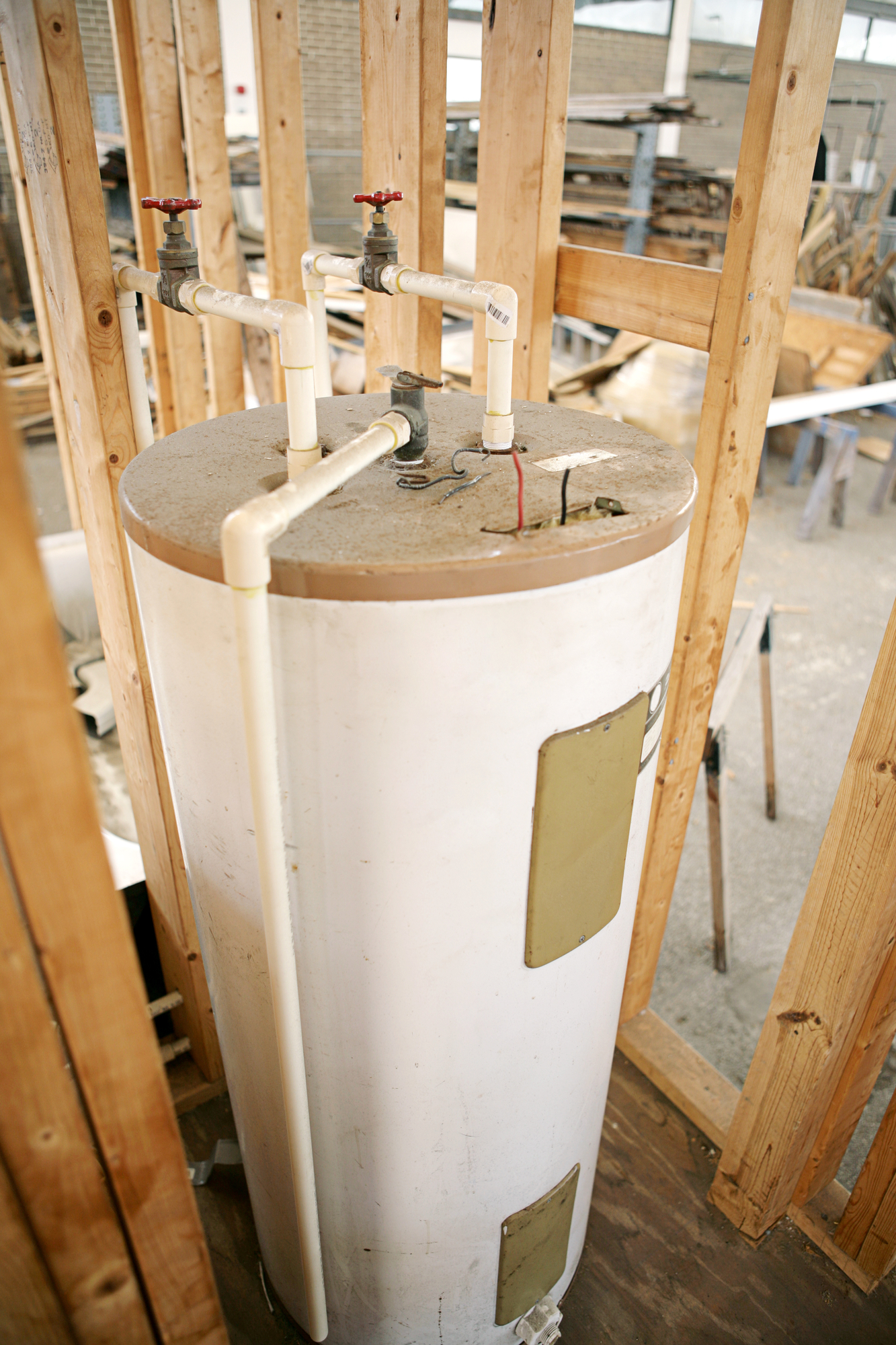

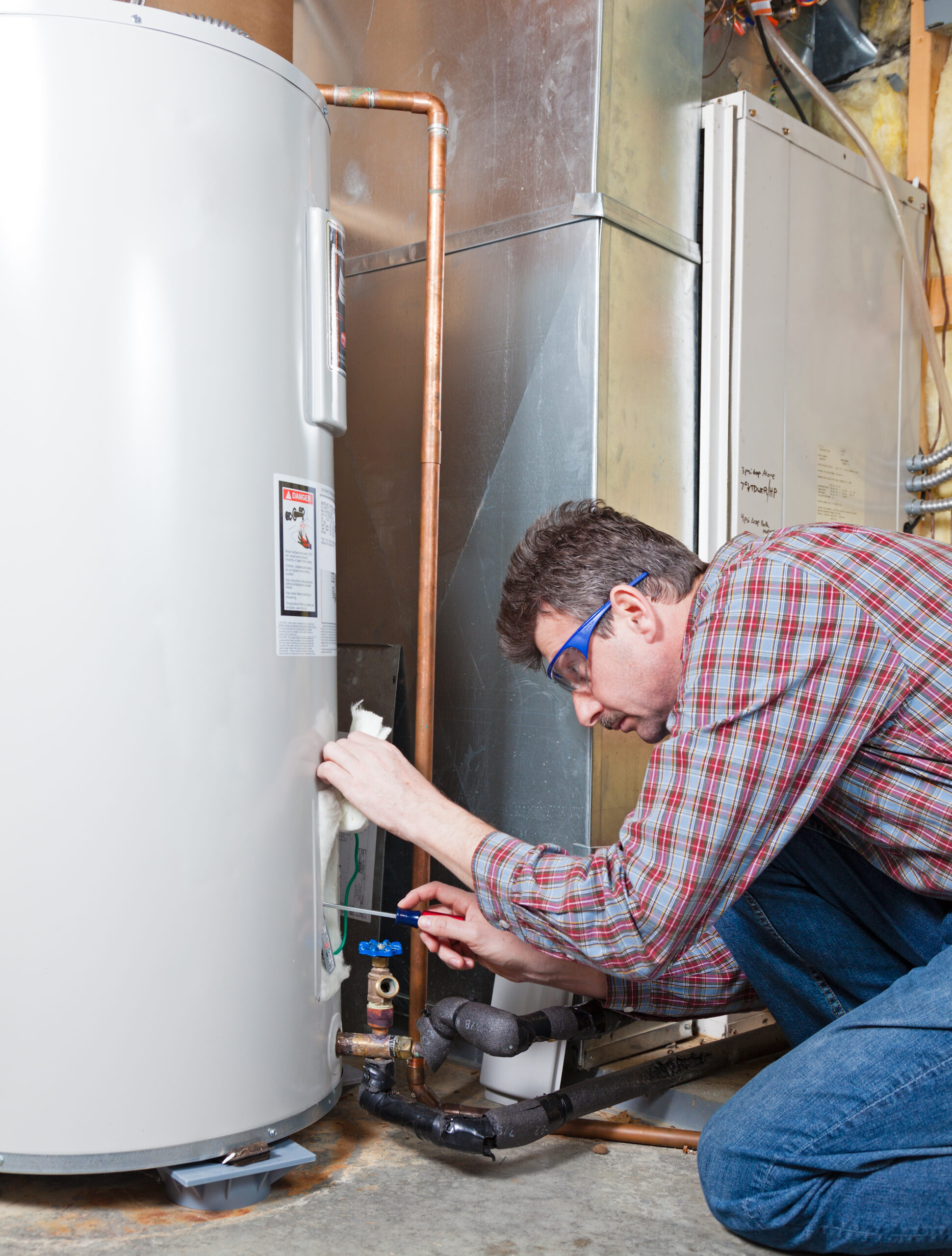

Do I Have to Replace My Water Heater?
It’s crucial for homeowners to understand when to change a water heater. Keeping an eye on the water heater’s condition will reveal any warning signals of a failing heater. A unit’s sudden failure will necessitate replacement right away, but there are many warning signs that a water heater is getting close to the end of its useful life and it is good to know beforehand so you can prepare.
Cloudy or rusty water
It’s typical for silt to accumulate within older water heaters’ tanks or for the equipment to corrode. Hot water may then come out rust-colored, grit-filled, or hazy. This can occasionally be fixed by having the water heater descaled, but if the issue continues despite maintenance, a replacement may be required.
It’s also a good idea to make sure the issue is with the water heater and not with any other component of the house’s plumbing. Run cold water from the faucet to quickly determine if the issue is exclusive to the water heater. If the water is also cloudy or rusty, the issue is most likely unrelated to your water heater.
Disturbing noise
It usually indicates that the water heater needs repair if a homeowner hears loud pounding or knocking coming from the appliance. The sound is brought on by extra sediment build-up striking the water heater tank’s walls before entering the water supply. If not removed, sediment build-up over time can also damage the water heater. It makes sense to look into these weird water heater noises as soon as possible because water heater repair is far less expensive than replacement.
Frequent repairs
Keeping track of the total number of times a hot water heater has been fixed in a year is a great way to determine when it needs to be replaced. Your home’s water heater shouldn’t require servicing more than thrice a year. Consider arranging for a new installation rather than investing money to extend the lifespan of your water heater. Contact our plumbers to set up a water heater installation or repair appointment. You can also find out from our specialists at Seattle Water Heaters whether it needs to be replaced at all.
Age of your water heater
Water heaters lose their efficiency at a certain age, like all appliances. Water heaters are also evolving, and with time, parts may become obsolete and hard to find. Standard tank water heaters should last between 8 and 12 years, while tankless heaters have a 20-year lifespan. If the appliance is at least 8 years old and is displaying any failure symptoms, a replacement will probably be required pretty soon.
Water with a metallic taste
When hot water tastes metallic, it means that the tank’s metal is corroding and seeping into the water. Decalcifying the tank might solve the problem, but if the metallic taste persists after maintenance, it might be time to replace the old appliance.
Leaking
The water heater is failing when it begins to leak. Over time, the unit is weakened by years of heating and cooling, and the metal may split due to the expansion and contraction. Although the leak might be temporarily plugged, it will probably soon be necessary to replace the water heater.
Rising energy costs
A rise in energy costs could indicate that the water heater is not operating effectively. Occasionally, a fast reset of the thermostat will solve the problem; normally, the temperature should be set between 120 and 140 degrees. If adjusting the unit’s temperature does not solve the issue, there might be a more serious issue.
Can I install a replacement water heater myself?
An expert, highly skilled DIYer may be able to obtain the necessary licenses from the local government and replace a water heater in their own home, but mistakes can be costly and deadly. If something goes wrong, the costs of clean-up and repairs could very well be higher than what it would have cost to hire a professional in the first place.
Which water heater installation costs the least?
A typical tank-style water heater would be the cheapest to install. This sort of water heater typically costs between $700 and $2,500, supplies and labor included. Compared to conventional tank heaters, tankless water heaters can cost two to three times as much.
How much time does a replacement water heater installation take?
It will take 2 to 3 hours to completely swap out a water heater with one of a similar design. The process will take longer if the new unit is tankless and the old unit has a tank.
What causes water heater failure?
A number of avertable factors can cause water heaters to fail before they ought to. They include:
- Internal rust caused by a worn-out anode rod. Every year, inspect the anode rod and replace it if necessary.
- The high mineral concentration of water, causing sediments to accumulate inside the tank. Annual tank flushing will remove any accumulated silt.
- Excessive water pressure, damaging the water heater and other components of the water system. Replace or modify the pressure relief valve if the water pressure entering the home exceeds 80 psi.
- A water heater that is too small will work too hard, which can hasten component wear. A hot water heater that is appropriate for the number of occupants in the house should be used in its place.
How long will my water heater last?
A tank-style water heater should last between 8 and 15 years, while a tankless heater has a minimum lifespan of 20 years. By scheduling routine maintenance and replacing the anode rod (which protects the unit from corrosion and normally lasts around 5 years) homeowners can extend the life of a water heater.
